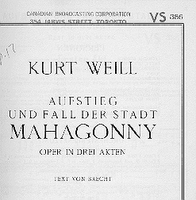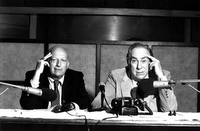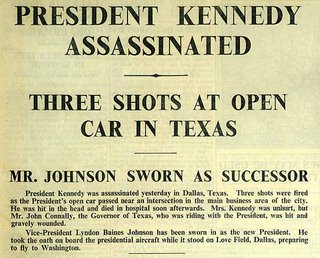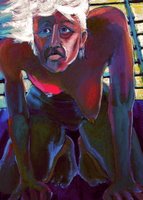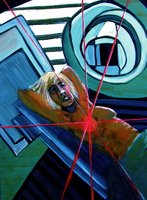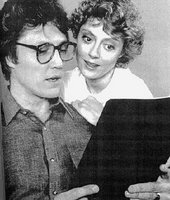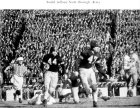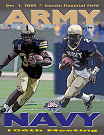About fifteen years ago, when I was at the height of my fanaticism about
hyperdrama, I used to explain the new dramaturgy to the uninitiated by bringing up the activity at a typical family Thanksgiving gathering. The spiel went this way:
Imagine Thanksgiving day at grandma's house. It's before the meal is served. In the kitchen, women are making last minute fixings. In the den, guys are watching a football game on TV. Others are here and there throughout the house, relatives catching up, or maybe a marital disagreement in process here and there. A big house with lots of people throughout it all talking at once.
Now imagine all these people are actors. Imagine the words they are speaking -- at least most of them -- were written by a playwright. This is hyperdrama.
Now add the audience as invisible voyeurs who mix among the action and the actors without being noticed by them. This is hyperdrama.
Hyperdrama definitely is not for everyone. After all, with a dozen or more storylines going on simultaneously throughout grandma's house, how in hell do you "see the play"? Well, you don't. Or more correctly,
you define the play you see yourself by your choices in what you choose to observe, what actors you choose to follow, where you choose to be in the house. Obviously hyperdrama benefits from more than one viewing! Indeed, in the practical commercial setting, the form works best when groups come together, choose different actors to follow, and then compare notes later.
I'm still a fanatic but I no longer have the energy, physical or mental, to create hyperdrama myself. I've had seven of them produced and, in fact, I know of no one in the world who has had more hyperdramas produced.

My most ambitious hyperdrama project was
The Seagull Hyperdrama, my original translation and expansion of the Chekhov play. It's also available on
disk and as a
paperback if you want to have it offline for some reason.
Several European graduate students have written theses on hyperdrama, using my work and the work of others in the new form. A German woman wrote and produced an amazing hyperdrama: in a castle she simultaneously ran
Romeo and Juliet, Stoppard's
Rosencrantz and Gildenstern Are Dead and her own original play about Orphelia. That's probably the most impressive hyperdrama production I know of. My own
Chateau de Mort in the Pittock Mansion may be second. Seagull would require a country home on a lake for its setting, fat chance. At any rate, Europeans take hyperdrama more seriously than we do here.
For those wanting to learn about this recent form of theater, I would recommend reading the following in order:
- Watch Out, Mama, Hyperdrama's Gonna Mess With Your Pittock Mansion! to realize the incredible energy and fun associated with hyperdrama.
- What is Hypertext?, my essay introducing the rhetorical basis of hyperdrama, which has been translated into more languages than anything else I've written.
- The New Hyperdrama, applying the hypertext rhetoric to theater.
 The Last Song of Violeta Parra, my one-act hyperdrama about the "Bob Dylan" of Chile. This was commissioned by a theater company in Santiago and developed during "an electronic residency" over a summer in a chat room where I met with the Chilean director and actors every week. An amazing experience! It's been produced in Spanish (the director's translation) several times but never in English. Anybody want an English language premiere of an internationally known hyperdrama?
The Last Song of Violeta Parra, my one-act hyperdrama about the "Bob Dylan" of Chile. This was commissioned by a theater company in Santiago and developed during "an electronic residency" over a summer in a chat room where I met with the Chilean director and actors every week. An amazing experience! It's been produced in Spanish (the director's translation) several times but never in English. Anybody want an English language premiere of an internationally known hyperdrama?
I was introduced to the form when Steve Smith at Theatre Workshop commissioned me to write what became "Chateau de Mort." His original idea was to have me lead a team of writers -- he couldn't imagine one person writing such a thing. But I convinced him that our deadline wouldn't benefit by the arguments and haggling every writing team gets stuck with and that, yes, I actually could write this myself. And so I did.
Writing it was a wonderful experience, about which I've written extensively. The highlight was finishing up the script during a month I spent in a lakeside cabin at Wallowa Lake. Local folks brought food to my door, loaned me a kayak, were good neighbors far beyond the call of duty. At nights I hung out at Swede's Tavern in Joseph, and this is where I got the idea for my short story,
The First Stoplight in Wallowa County, which was later published in
Northwest Magazine. Ah, hyperdrama brings fond memories!



